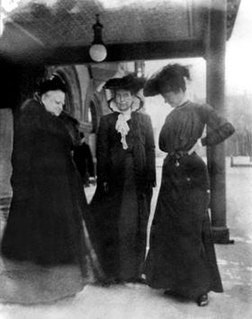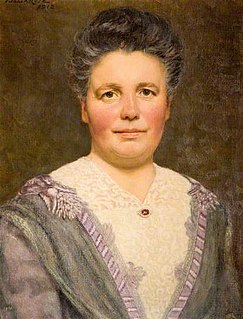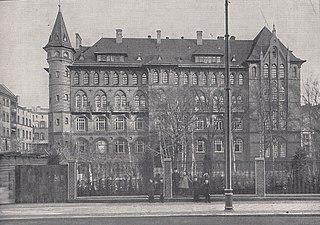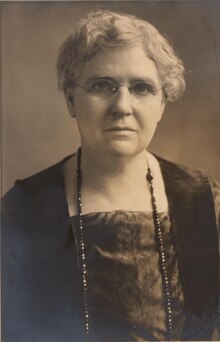
Friedrich Wilhelm August Fröbel or Froebel was a German pedagogue, a student of Johann Heinrich Pestalozzi, who laid the foundation for modern education based on the recognition that children have unique needs and capabilities. He created the concept of the kindergarten and coined the word, which soon entered the English language as well. He also developed the educational toys known as Froebel gifts.

The Froebel gifts are educational play materials for young children, originally designed by Friedrich Fröbel for the first kindergarten at Bad Blankenburg. Playing with Froebel gifts, singing, dancing, and growing plants were each important aspects of this child-centered approach to education. The series was later extended from the original six to at least ten sets of Gifts.

Columbia College Chicago is a private art college in Chicago, Illinois. Founded in 1890, it has 5,928 students pursuing degrees in more than 60 undergraduate and graduate degree programs. It is accredited by the Higher Learning Commission.

Susan Elizabeth Blow was an American educator who opened the first successful public kindergarten in the United States. She was known as the "Mother of the Kindergarten."

Maria Kraus-Boelté (1836–1918) was a pioneer of Fröbel education in the United States, and helped promote kindergarten training as suitable for study at university level.
Froebel College is one of the four constituent colleges of the University of Roehampton.

Lucy Wheelock was an American early childhood education pioneer within the American kindergarten movement. She began her career by teaching the kindergarten program at Chauncy-Hall School (1879–89). Wheelock was the founder and head of Wheelock Kindergarten Training School, which later became Wheelock College in Boston, Massachusetts, and is now the namesake of Boston University's college of education BU Wheelock. She wrote, lectured, and translated on subjects related to education.

Froebel College of Education was one of five colleges in Ireland which was recognized by the Department of Education and Skills for the training and education of national school teachers. It was located at Sion Hill, Cross Avenue, Blackrock, Dublin and was run by the Dominican Order.
Friedrich (von) Beust, German soldier, revolutionary and political activist and Swiss reform pedagogue, was the son of Prussian Major Karl Alexander von Beust. Beust was born in the Odenwald, in whose great forests, as a young man, he observed Nature in her large and small aspects and collected her creatures. He learned to ride a horse in the royal stables. In 1834, he became an ensign in the 17th Prussian regiment. Under the guidance of a captain, he drew maps in his free time. He entered the division school at Düsseldorf where he was especially interested in geography, which students of Carl Ritter were teaching. He continued his studies of cartography and also science, especially anatomy. In 1845, he was ordered to Fortress Minden, where he came to the conclusion he could not fit into Prussian military discipline, bitterly resigned in 1848, and became a political activist.

Edna Dean Baker (1883–1956) was an educator, author, co-founder of Baker Demonstration School, and President of the National Kindergarten and Elementary College from 1920 to 1949. She was an early advocate for kindergarten style early childhood education in the United States.
Bertha Ronge was an activist in the causes of childhood education, women's education and religious freedom. She established the kindergarten movement in England, where she founded the first three kindergartens in London, Manchester (1859) and Leeds (1860). She followed the precepts of Friedrich Fröbel, who advocated the use of structured play activities to promote learning. Bertha Ronge was largely responsible for Fröbel's kindergarten concept gaining a foothold in England.

Elizabeth Harrison was an American educator from Kentucky. She was the founder and first president of what is today National Louis University in Chicago, Illinois. Harrison was a pioneer in creating professional standards for early childhood teachers and in promoting early childhood education.

Dame Geraldine Southall Cadbury, DBE was a British Quaker, author, social and penal reformer. Geraldine was one of the first women in Birmingham to become a magistrate. From 1923, she chaired the justices’ panel in the Children’s Court of Birmingham. In the 1930's she assumed prominent positions on several Home Office Committees and International Associations.
Norman Alexandroff was Jewish-Russian immigrant to the United States who became known as a radio broadcaster in the early 20th century and a developer of the radio broadcasting curriculum at the Pestalozzi Froebel Teachers College and the Columbia College of Expression in Chicago, Illinois. When the Pestalozzi Froebel Teachers College and the Columbia College of Expression separated in 1944, Alexandroff became the fifth president of Columbia College.
Caroline Garrison Bishop was a British advocate for kindergartens. She co-ordinated the introduction of these ideas in London and later opened a college in Birmingham.

The Pestalozzi-Fröbel-Haus was founded in 1882. It was one of the first institutions in Germany which started to train early childhood teachers, as well as one of the first where women could get a professional training in Berlin. It practiced a belief in teaching children as individuals.

Sophia "Zoe" Benjamin was a pioneer of early childhood education in Australia.

Eleanor Sophia Smith was an American composer and music educator. She was one of the founders of Chicago's Hull House Music School, and headed its music department from 1893 to 1936.

Henriette Goldschmidt (1825–1920) was a German Jewish feminist, pedagogist and social worker. She was one of the founders of the German Women's Association and worked to improve women's rights to access education and employment. As part of that effort, she founded the Society for Family Education and for People's Welfare and the first school offering higher education to women in Germany.

Emilie Louise Michaelis (1834-1904) was German-born pioneer of the kindergarten system in England, and a translator, editor, and promoter of Froebel's writings. In 1875, she started one of the first English kindergartens in Croydon, London, and later a training college for teachers, which became Froebel College. She was described as the 'chief exponent of Froebelianism in England' and coined the phrase 'nursery school' in translation from Froebel.















